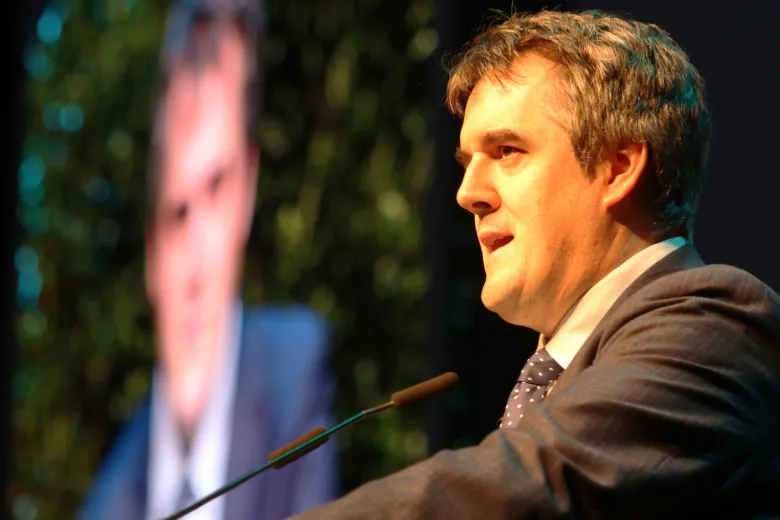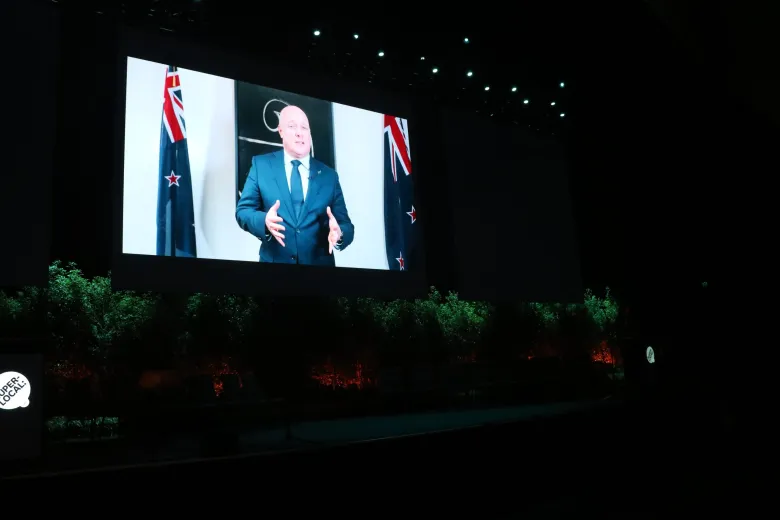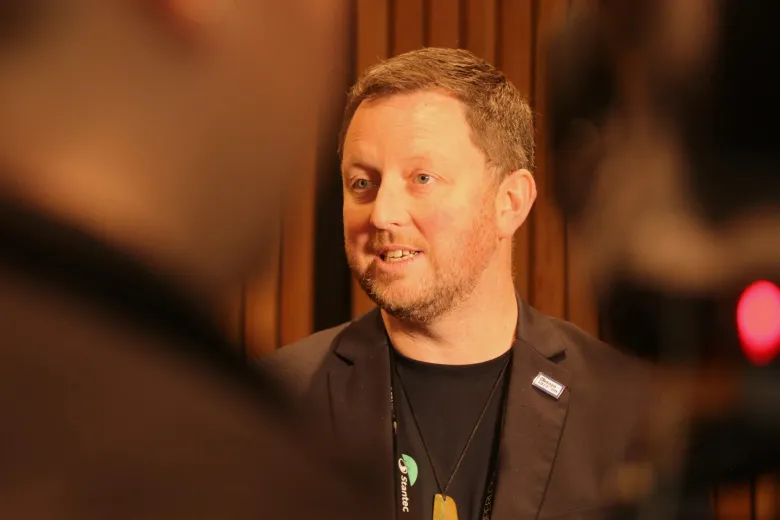‘Just a bit patronising, mate!’ shouts a conference-goer, as the Local Government Minister compares councils to children

Analysis: It’s a sentiment likely to set pulses racing among the current crop of Government ministers.
In 2010, four-term councillor Bryan Cadogan aimed to unseat sitting Clutha mayor Juno Hayes by running on a platform of tying rates to inflation and focusing on core services. Cadogan won by 354 votes, turning around the previous election result in the district hemmed in by Dunedin, Central Otago, and Southland.
Now, the Clutha mayor, who isn’t running for re-election in October’s elections, finds himself, and his sector, in the firing line of an interventionist Government considering rates caps, and introducing legislation to ensure councils focus on – that’s right – core services.
The Local Government NZ conference in Ōtautahi/Christchurch was formally launched on Wednesday with a video address, of less than two minutes, by Prime Minister Christopher Luxon.
Councils need to get back to basics, he said, spending wisely and delivering value. What does that mean? “Prioritising pipes over vanity projects,” explained the prime minister, flanked by national flags. “It means roads over reports, and it means real outcomes.”
When the address finished, conference MC Miriama Kamo started clapping loudly, joined somewhat unenthusiastically by a smattering of conference attendees. “I’m the only one clapping, I see,” Kamo quipped.
Cadogan says the Government’s message landed “pretty flatly” with him. “It’s getting a wee bit tedious getting asked time and time again to do the impossible.”
Chris Bishop, the minister overseeing resource management reforms, took a more fire and brimstone approach than his leader, saying there was shrinking evidence councils were cutting their cloth and enabling growth.
“You cry out for more financing and funding tools. We’re giving them to you. You ask for a better, simpler planning system. We’re giving this to you, too.
“We are getting our house in order. It’s time you sorted yours out.”
(Some would have thought that line a bit rich, given analysis of May’s Budget suggests Luxon’s coalition will increase gross debt by more in five years than the Covid-affected previous government did in six.)
Bishop announced a “plan stop”, warning councils not to waste money and time reviewing city and district plans, and regional policy statements – with narrow exceptions – ahead of an overhaul of resource management laws due to land in 2027.

Sam Broughton, mayor of Selwyn, just south of Christchurch, and president of Local Government NZ, says: “It was really good to have that certainty.”
Is that just common sense? Broughton says the progress on reforms is pleasing, but adds: “It feels like councils have been in this reform storm for six or seven years, and has just been ongoing change without actually landing something.”
Local Government Minister Simon Watts introduced the bill to focus councils on core services, which is expected to have its first reading on Thursday. (“It feels like the Government has a caricature of local government that isn’t true,” Broughton says. He notes 80 percent of Selwyn council’s capital spending is on pipes and roads.)
Watts’ explanation of why it was necessary to force councils to concentrate on core services, like roads, water and rubbish, sent offended ripples through the conference crowd.
The minister used the analogy of setting boundaries for his children. Letting them do whatever they liked might lead to bad choices, he suggested. Instead, he might tell them, “Hey, you’ve got these five things to do”.
Among the crowd’s murmurs, one conference-goer shouted: “Just a bit patronising, mate!”
From the conference stage, Watts appeared to pour cold water on the idea regional councils were about to be scrapped. “We’re thinking about it,” Watts said, adding ministers were cognisant “there’s already a huge amount of reform underway in your sector”.
Bishop tried to mollify concerns about potential environmental consequences from the audience, saying a new Natural Environment Act would focus on biodiversity, ecology and human health. Later, the minister tells Newsroom: “There will be environmental limits that will be set through the new regime.”
(After a remit passed at Local Government NZ’s annual general meeting on Wednesday, councils called for a review of local government’s structure.)

Government reforms for local government include the network-merging replacement for three waters, Local Water Done Well, waving city and regional deals under the noses of councils, and offering different funding and financing options for infrastructure to speed up house-building.
Back to Cadogan, the Clutha mayor, who talks to Newsroom while walking to a negotiation with other councils on water services.
He says despite Government rhetoric, councils can’t be expected to achieve the triumvirate of lower rates, infrastructure upgrades and under-control debt. “The Government know it, we know it, but we just keep on getting this.”
Clutha council’s experience puts those financial management challenges in stark relief.
In 2019, its external borrowings were $5 million. Five years later, it had ballooned to $123m. To add salt to the financial wound, this year’s average rates rise was an “ungodly” 16.59 percent.
How did this happen? “Three waters, wholly and solely,” Cadogan says.
(Last year, the mayor predicts the financial consequences of the “three waters debacle” will hit. In the latest annual plan, he says 89.4 percent of this year’s rates rise is attributable to roads, rubbish and three waters.)
Clutha’s unfortunate figures are: the third-longest water reticulation network in the country, with 27 sewage or water plants on 30-year consents, and, crucially, only 18,500 people to pay for it.
Of the country’s 565 drinking water quality breaches last year, 338 or 60 percent were in Clutha.

Cadogan gives the example of a water upgrade for the tiny town of Waihola: running an 18.5km pipeline from Milton’s water treatment plant oto the reservoir cost $6.3m. After years of problems with water quality and quantity, boil water notices were removed for all but 20 of the town’s 247 houses.
“Then we go to Heriot, and then we go to Tapanui, then Owaka, then Clinton,” Cadogan says. “It’s a financial delusion that you can have rates cap, you can have debt ceilings, and you have to do this infrastructure update.”
It would have been better for the National-led coalition to lift the hood on Labour’s three waters policy and chuck out what they didn’t like, Broughton says, instead of scrapping it and starting again. He thinks resolving water across the country might take seven or eight more steps.
Policy lurches and delays cost millions of dollars and can, of course, increase council rates.
Many councils might feel aggrieved by the ministerial attack given the National Party’s pre-election commitment to devolution and localism. Luxon promised to reshape the relationship between central and local government.
“It does feel like every party in opposition is a localist,” Broughton says, “and then as soon as they’re in power, they become a creature that draws all the more power to themselves.”
Broughton was applauded by conference attendees for his opening comments – made before Bishop’s address.
“We all want lower rates increases. I want lower rates increases, I know you want lower rates increases, I hear from my community they want lower rates increases. But it can’t be at the expense of our children picking up the tab because of our negligence today.”
The Selwyn mayor tells Newsroom a key problem is councils have few alternatives to raise money.
The best tool the Government could give councils, in his opinion, is to return GST spending on new houses locally. “That would be a game-changer for us,” he says, noting between 1000 and 3000 houses have been built each year in Selwyn over the past five or six years.
Broughton’s also a fan of bed taxes, something Queenstown’s council has, for years, been pushing for. Luxon said this week the Government’s not actively considering a bed tax.
‘It has just been an avalanche of unstoppable figures. Unstoppable.’
Bryan Cadogan, Clutha mayor
This is the second year ministers have used the Local Government NZ conference to berate councils for spending on “nice-to-haves”.
Last year, the venue, Wellington’s $180m Tākina centre, was in the crosshairs. But Christchurch’s half-billion-dollar monolithic convention centre, Te Pae, is of a different ilk – paid for by taxpayers as a post-quake anchor project.
Luxon, Watts and Bishop did miss a trick in Christchurch, though.
A 15-minute walk away from Te Pae is the new stadium, Te Kaha – a loss-making facility that will cost ratepayers $453m to build. The city’s ratepayers face a three-year, cumulative rates rise of 24.66 percent that without the stadium would have been 19.43 percent.
Using Luxon’s words, the stadium isn’t roads, rubbish or water, and tends, perhaps, more towards a vanity project.
The last word goes to Cadogan, the outgoing Clutha mayor. He hopes a water services “umbrella” with other councils will help his district save on infrastructure spending.
“We’ve been basically a stand-alone council for the last five years. Have a look what that did to our debt,” he says.
“I’m gutted as a mayor. I pride myself on really understanding figures. I understand them all right. It has just been an avalanche of unstoppable figures. Unstoppable.”

